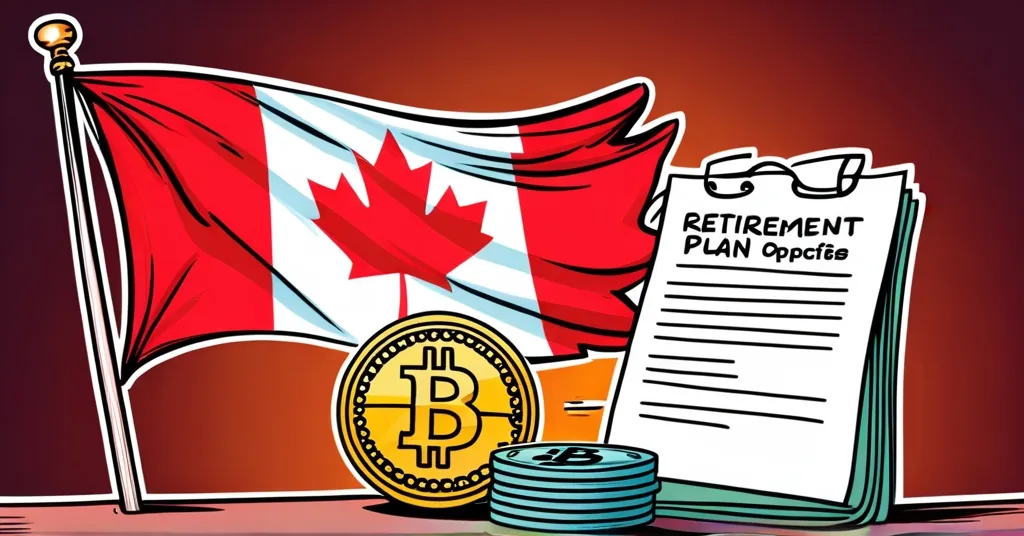Trump’s Crypto Win Sparks Canadian Push for Stablecoin Rules and Bitcoin Retirement Plans

Trump’s Crypto-Friendly Agenda Inspires Canadian Policy Push on Stablecoins and Bitcoin Retirement Plans
Donald Trump’s pro-crypto stance following his election victory has spurred Canadian cryptocurrency advocates to push for regulatory changes north of the border. Key areas of focus include the regulation of stablecoins, integrating Bitcoin into retirement plans, and establishing tax-free crypto accounts.
- Stablecoin regulation and USDC approval
- Bitcoin in retirement plans
- Tax-free crypto accounts
- Grassroots activism and political influence
Trump’s crypto-friendly agenda has ignited a blaze of action among Canadian crypto advocates. Unlike their U.S. counterparts, who poured $135 million into campaigns through organizations like Crypto’s Fairshake PAC, Canadian leaders are limited by stringent donation caps. Yet, this hasn’t slowed them down; it’s fueled their creativity and determination. They’re leaning into community-driven efforts, a strategy that’s proving to be a potent force in the face of regulatory red tape.
In mid-2023, Stand With Crypto, a U.S. advocacy group, recognized the potential for a strong grassroots movement in Canada and extended its reach across the border. This move underscores a global trend of increasing political interest in cryptocurrencies, with Canada’s strategic market position and abundant energy resources making it a prime location for blockchain innovation.
Stablecoin Regulation
Stablecoins are cryptocurrencies designed to minimize volatility by pegging their value to stable assets like the U.S. dollar. They’re crucial for bridging traditional finance and the crypto world, offering a more predictable value for transactions and investments. Canada recently hit a regulatory milestone when Circle’s USDC became the first stablecoin approved under the new Value-Referenced Crypto Asset (VRCA) standards by the Ontario Securities Commission (OSC) and the Canadian Securities Administrators (CSA). This approval, announced on December 3, 2024, allows registered crypto trading platforms to offer USDC without the previous retail purchase limit, signaling a shift towards integrating stablecoins into the Canadian financial system.
However, the path to a comprehensive stablecoin regime in Canada has been fraught with delays. The CSA has postponed its stablecoin regime twice, and stablecoins are not yet included under Canada’s prudential payment services framework. This uncertainty has led to criticisms of the “painfully slow” pace of regulatory change, especially given the potential for stablecoins to enhance consumer protection and support innovation in the payment sector.
Bitcoin in Retirement Plans
The idea of integrating Bitcoin into retirement plans is gaining traction in Canada, driven by the cryptocurrency’s potential as a long-term store of value. Including Bitcoin in retirement plans could offer Canadians a hedge against inflation and diversify their investment portfolios. However, this move is not without risks; the volatility of Bitcoin could pose challenges for those seeking stable retirement income.
Despite these concerns, the discussion around Bitcoin in retirement plans is gaining momentum, with industry leaders like Dean Skurka, CEO of WonderFi Technologies Inc., expressing cautious optimism. Skurka noted,
“We’re hopeful, but it hasn’t quite played out that way in Canada historically, and obviously in the U.S. this is the first time that it’s really become an election issue. Hopefully the positive response that it has seen the start of will be a signal to Canadian politicians to take it seriously.”
Tax-Free Crypto Accounts
Canadian crypto advocates are also pushing for the establishment of tax-free crypto accounts, similar to Tax-Free Savings Accounts (TFSAs). These accounts would allow Canadians to invest in cryptocurrencies without incurring taxes on their gains, potentially boosting crypto adoption and investment in the country. Such a move could position Canada as a leader in crypto-friendly policies, attracting investors and innovators alike.
Grassroots Activism and Political Influence
With donation limits hampering the ability to fund large-scale campaigns, Canadian crypto advocates are focusing on community-driven efforts to push their agenda forward. This grassroots activism is proving effective, as evidenced by the increased interest and engagement in digital assets following rising crypto prices and trade volumes.
Canadian political leaders are taking note, aiming to make digital assets a defining issue in the upcoming federal election. They’re promoting the adoption of blockchain technology and open banking legislation that incorporates cryptocurrency, recognizing the potential economic benefits. Lucas Matheson, CEO of Coinbase Canada, emphasized the importance of staying competitive, stating,
“There are significant changes coming in how the U.S. government and citizens in the U.S. take advantage of the digital economy. It’s incredibly important that Canadians don’t miss out on this and sit on the sidelines and wait until the rest of the world has figured out how to take advantage of digital assets.”
However, it’s not all rosy. Major crypto platforms like Binance, Bybit, and OKX have exited the Canadian market due to stringent regulatory pressures. This exodus highlights the urgent need for more favorable regulations to maintain Canada’s competitiveness in the global digital economy.
Challenges and Critiques
While the push for crypto-friendly policies in Canada is gaining steam, it’s crucial to acknowledge the challenges and potential downsides. The departure of major crypto platforms due to regulatory pressures underscores the need for a balanced approach to regulation—one that encourages innovation while protecting consumers. Critics also point out the risks associated with integrating volatile assets like Bitcoin into retirement plans, emphasizing the need for robust investor education and safeguards.
Moreover, the slow pace of regulatory change in Canada has been a source of frustration for the crypto community. Sophia Cote, Head of Public Policy at Shakepay Inc., noted Canada’s historical lead in crypto regulation but highlighted the current uncertainty around stablecoin regulation. This uncertainty could hinder Canada’s ability to capitalize on the global crypto boom and attract innovative companies.
Future Outlook
Looking ahead, the future of Canadian crypto policy is likely to involve continued efforts to align with U.S. regulatory standards and leverage Canada’s abundant energy resources to support energy-intensive crypto operations like mining. Collaboration with U.S. firms could be key to accessing larger investment pools and staying competitive in the global market.
As Canada navigates these regulatory waters, the potential for stablecoins to be regulated under payment services frameworks offers a promising direction. This could provide more robust consumer protection and support innovation, positioning Canada as a leader in the digital economy.
Key Questions and Takeaways
- What inspired Canadian crypto advocates to push for regulatory changes?
Donald Trump’s pro-crypto election victory and the success of similar campaigns in the U.S. inspired Canadian advocates to seek regulatory changes, hoping to stay competitive in the global digital economy.
- What specific areas are Canadian crypto advocates focusing on?
Canadian crypto advocates are focusing on the regulation of stablecoins, integrating Bitcoin into retirement plans, and establishing tax-free crypto accounts.
- How have U.S. crypto industry contributions influenced Canadian crypto efforts?
The U.S. crypto industry’s $135 million in campaign contributions have motivated Canadian advocates to engage in grassroots activism due to Canada’s severe donation limitations.
- What recent regulatory milestone did Canada achieve with USDC?
Canada approved USDC under new Value-Referenced Crypto Asset (VRCA) standards, marking it as the first stablecoin provider to gain such approval.
- Why have major crypto platforms like Binance, Bybit, and OKX exited the Canadian market?
These platforms left due to stringent regulatory pressures from the Canadian Securities Administrators, which imposed harsher regulations towards the end of 2023.
- How have rising crypto prices influenced interest in Canada?
Rising crypto prices and trade volumes have increased public interest and engagement with digital assets, leading to more sign-ups and transactions on platforms like Coinbase Canada and WonderFi Technologies.
- What are Canadian political leaders hoping to achieve with digital assets?
They aim to make digital assets a defining issue in the upcoming federal election, promoting the adoption of blockchain technology and open banking legislation that incorporates cryptocurrency.



